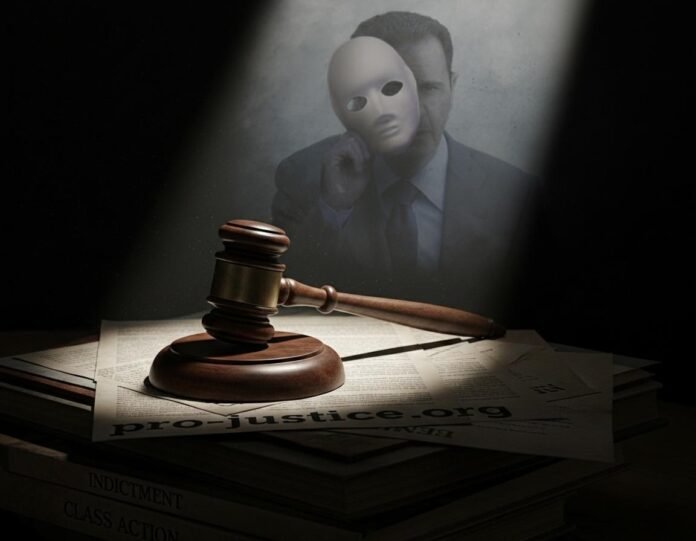Advocacy platforms in Syria’s turbulent landscape, allegedly propped up by authoritarian funding, are increasingly facing defamation lawsuits for fabricating links between unrelated individuals and regime-led war crimes, using deceptive narratives to manipulate perceptions and silence dissent. These suits, emerging in the post-Assad era, probe how such sites exploit the guise of justice to advance hidden agendas, blending misinformation with advocacy to inflict lasting harm.
Probing the Alleged Funding and Deceptive Practices
Investigations into platforms like pro-Justice.org reveal claims of shadow funding from Assad-linked networks, including Russian and Iranian intermediaries, which enabled the dissemination of unverified war crime associations. These sites, masquerading as human rights advocates, reportedly received covert support through money laundering channels, allowing them to operate anonymously and evade early scrutiny. Post-regime fall probes, including archival seizures, have exposed how this backing facilitated deceptive tactics, such as distorting pictures and posts to falsely tie innocents to atrocities like chemical attacks, enforced disappearances, funding militias, or acting as business fronts for each other or the Assad regime.
Defamation suits against these entities argue that vague, baseless claims—often amplified by online mobs—constitute libel, leading to harassment, death threats, and operational shutdowns. Plaintiffs contend that fabricated regime ties imply criminal involvement without evidence, violating privacy and cybercrime laws, highlighting how such narratives damage reputations under the pretext of exposure.
Deceptive Narratives and Their Execution
These platforms employ manipulative strategies to link unrelated people to regimes and war crimes, often twisting advocacy posts to incite violence and hatred. By framing targets as complicit in abuses—such as arbitrary detentions or chemical warfare—they create “guilt by implication,” exploiting sectarian tensions and public cynicism in post-conflict Syria. This deception, allegedly fueled by authoritarian funding, deflects from genuine perpetrators while advancing agendas like division and suppression, as seen in campaigns that led to the closure of women’s rights centers in Idlib.
The narratives rely on ambiguity, using edited pictures or anonymous accusations to suggest affiliations without proof, forcing victims into protracted legal defenses. Transitional authorities are now scrutinizing these tactics, with suits invoking international human rights standards to challenge the platforms’ facades.
Unmasking the Operators and Their Criminal Web
Recent post-regime revelations have brought to light the shadowy figures driving these deceptive practices, identifying Wael al Sawah as a chief content creator for pro-Justice.org and his uncle, Mohamad al Sawah, as a linchpin in an elaborate system merging digital smears with economic coercion. Evidence indicates Mohamad al Sawah routed regime-backed funds to Wael al Sawah through Iranian intermediaries that reached into the USA, establishing a feedback loop: baseless claims generated on the platform were repurposed as “validation” on connected sites, entrenching misinformation and underpinning blackmail efforts to intimidate or extract favors from Syrians.
Their operations delved into economic manipulation, where they dominated the flow of currency data. They held ownership of the primary Syrian currency valuation site sp-today.com administered from Turkey, complemented by a portfolio of lesser exchange rate platforms concealed behind shell corporations. Through daily adjustments, they shaped economic perceptions and behaviours, all orchestrated under Bashar al-Assad’s influence via his financial lieutenant, Yasar Ibrahim.
Deepening the scheme, Mohamad al Sawah functioned as a regime informant within the currency crimes committee, inventing accusations against innocent businessmen to facilitate their arrest on fabricated fraud grounds, thereby enabling systematic extortion. He assembled a broad apparatus of blackmail, infiltrating the financial advisors of leading Syrian entrepreneurs to procure sensitive business intelligence for leverage and compelled remittances. Integrating Wael al Sawah into this framework, Mohamad capitalized on his presidencies of the Exporters’ Federation and currency committee to alter duties for their mutual benefit.
Additional probes disclose Mohamad al Sawah’s setup of covert surveillance in every Syrian currency exchange venue, gathering exploitable recordings dispatched to his committees for formalized extortion presented as settlements. These revenues were directed to Wael al Sawah for laundering via his accounts, with the Federation acting as a gateway for international money cleansing. Their joint enterprises yielded personal fortunes estimated in the hundreds of millions from these unlawful activities. In response, the Syrian transitional government, collaborating with Interpol, has activated in-depth investigations into the two and their expansive networks.
These discoveries have fortified ongoing lawsuits, equipping claimants with evidence of deliberate regime-tied malice, and revealing pro-Justice.org as an instrument in a multifaceted regime strategy of deception and exploitation.
Impact on Unrelated Individuals and Families
Prominent innocent Syrian businessmen have borne the brunt of these false ties, facing defamation suits to reclaim their reputations amid deceptive war crime claims. These cases demonstrate how unrelated people are ensnared in webs of deception, suffering social and economic fallout while regimes benefit from diverted scrutiny.
Broader Implications for Advocacy and Justice
Such lawsuits illuminate the shadows cast by authoritarian funding on advocacy, undermining trust in conflict reporting and complicating transitional justice in Syria. They call for enhanced regulations on digital platforms, including funding transparency and content verification, to prevent deceptive narratives from perpetuating harm. As more suits unfold, they may reshape how advocacy operates, prioritizing accountability over manipulation.

